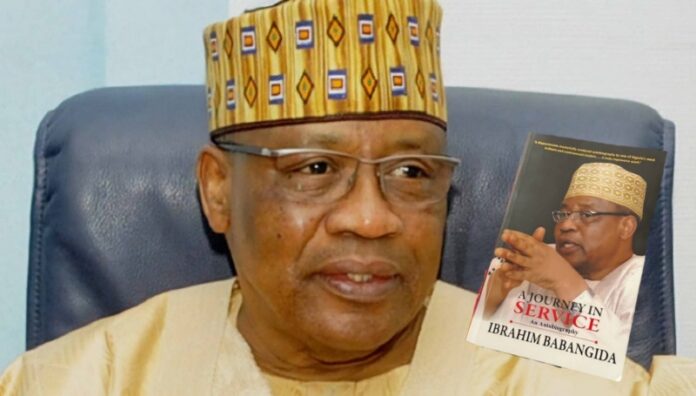Sonala Olumhense
On February 20, General Ibrahim Babangida set out to prove an important point.
If you were not paying close attention, you might have thought that by unveiling his memoir, “A Journey in Service,” IBB wanted to demonstrate that he can write.
Or that he has a conscience. Or that he loves Nigeria. Or that, in his mythical Maradona metaphor, he can score goals.
It was none of those, but first, let us separate the launch of the book from its substance.
The launch was three ideas in one. First, it was a private fundraiser, despite the diversionary rumour of the money going to a “presidential library.”
I mean, knowing that life is short, particularly given how he has negatively impacted so many people who crossed his path, IBB could have built a library a long time ago.
If even a kindergarten library for pre-schoolers in Minna meant anything to him, he could have built one as far back as 1993, and its first graduates would have been in the Nigerian work force already.
Second, the launch was a socio-political event. Although a few political stragglers appear at his Hilltop Mansion now and then, allegedly to seek support for their ambitions, the book launch was simply an opportunity to reassert himself at the centre of his universe.
Third, the event was a massage parlour. Nigerians are religious people. Some of us worship power and money relentlessly, and when those two—or the smell of them—congregate in one place, we are ready to sing and dance all night and do not wait to be invited.
IBB’s book launch was perfect for the massaging of his ego, and many arrived to do the honours. General Yakubu Gowon praised him. So did Goodluck Jonathan. President Bola Tinubu called him “our dear leader, father, and uncle,” deserving of his homage. “Let me say thank you for everything—for who you are, what you are, and how you have contributed to the history of this great country,’’ he gushed.
Even two-time leader, Olusegun Obasanjo, was at his bootlicking best.
He told Babangida to ignore his critics as he has “not only contributed to history; you have contributed to documenting history.”
Keep in mind: It is the same Obasanjo who, in 1994, warned Nigerians that Babangida was “a master of intrigues, mismanagement, corruption, manipulation, deceit, settlement, cover-up and self-promotion at the expense of almost everybody else and everything else.”
And then there was book reviewer and former Vice-President Yemi Osinbajo, who captured the gathering of former leaders as their “celebration of a fellow statesman.”
Missing on the main table was Osinbajo’s principal, Muhammadu Buhari, who was said to have been “represented.” Of course, Buhari, brimming with 40 years of uproarious indignation, would not stoop low to honour the man who evicted him from office as Head of State in 1985 and clamped him in jail.
IBB knows that among Nigerians, his book will not sell. The event was, therefore, a simple strategy for a massive payday from those who have the money but would not read it, and N17bn tumbled into the pockets of the celebrant on the spot, along with the public adulation.
So, what did IBB prove? First, the Nigerian political elite is malleable, empty and hypocritical.
In front of the cameras and microphones, he had reputable speakers praising him for the murder and mayhem he had inflicted on Nigeria one generation ago.
Think about it: Why did he execute his best friend, General Mamman Vatsa?
“We were very close friends,” says The Maradona. “…With the benefit of hindsight now, I recall that a constant part of our relationship as teenagers and young men was a continuous and recurrent peer jealousy on his part towards me. He was always envious of my achievements.”
Note that he specifies his fictitious “hindsight” as being of NOW, not as of the scene of his crime one generation ago.
He needed 30 years to cook it up. He forgot that in 2001, he told a ThisDay interviewer not of any jealousy by Vatsa, but of a healthy rivalry between them.
Babangida’s book is a reminder to Nigerians of his chilling brutality. Vatsa was not the Head of State, but he was clearly the brighter, more cultured, honourable, and humane one.
As I wrote in May 2016—reproduced last week—Babangida is no different from his ruthless military hero, Shaka Zulu.
Of the June 12 election, he now admits that Moshood Abiola won what he tragically annulled.
“That accident of history is most regrettable,” he says. “The nation is entitled to expect my expression of regret.”
Consider his words carefully. An “accident.” He is not a remorseful man and tenders no apology. You are entitled to expect his “expression of regret,” that’s all.
And of course, it was someone else, another who is dead, who is to be blamed for the annulment, Babangida affirms, not he who committed the annulment.
And what about Chief Abiola, his friend who won the presidency at the ballot box as opposed to the one who merely awarded himself the title, who lost his life as a result?
His wife was killed. His family was ripped apart and his business empire destroyed. Perhaps Abiola, too, was envious of IBB?
Dele Giwa and many others were killed. The human rights of hundreds of Nigerians were violated, and many were clamped into jail. Maybe they, too, were envious of IBB.
The truth is simpler: IBB is a crook and a coward who was always envious of the world around him.
As has nearly always happened in Nigeria, however, he found himself in power, armed with the freedom and the tools to hurt and deny those he feared, and to cling to that power for as long as he could.
It is a shame that the Nigerian political and economic elite shamelessly gathered in Abuja to celebrate and reward this evil man, in the lie that he is a statesman rather than who we all know him to be.
A statesman, on the contrary, is never self-centred, cunning and manipulative.
A statesman applies selfless wisdom and skillful commitment to the common good while in government.
That a legion of Nigeria’s former leaders trooped out to celebrate what they should abhor and condemn is evidence of how they see themselves and cheapen Nigeria.
The second thing that IBB proved, by default, is that some ordinary Nigerians are still scared of him. Perhaps they are.
Following the book launch, I received several powerful critiques of the event as they circulated on social media.
Most of them, however, were unsigned. Why are Nigerians who were old enough to witness the IBB betrayal of his country afraid to place their names next to their contempt of him?
No, Babangida is clearly not sorry for anything. He is the same arrogant and calculating traitor he has always been. And because of several other fake statesmen who know no patriotism or true honour, he will get away with it.
Coming from IBB, “A Journey in Service” is a joke awaiting a punchline. When will his journey start?

































































